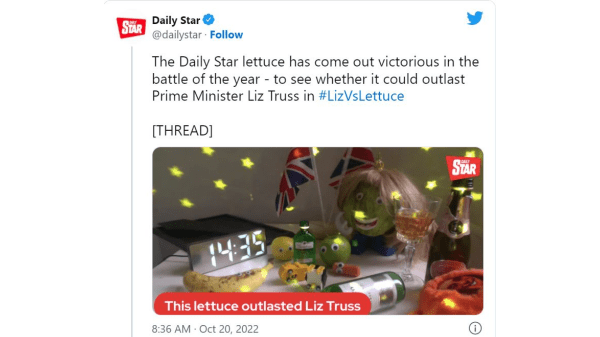It’s not often that a head of iceberg lettuce becomes a worldwide sensation.
But one specimen from the British supermarket chain Tesco achieved that honor after outliving Liz Truss as prime minister of the United Kingdom.

Following a remark in The Economist, which said that Mme. Truss’s premiership threatened to have “the shelf life of a lettuce,” the Daily Star newspaper started the stunt: putting a blond wig and Mr. Potato Head-like facial features on the vegetable and placing a webcam in front of it to monitor its longevity.
On day 7, the paper announced, “The lettuce outlasted Liz Truss.”
Ever fastidious about facts, The New York Times observed, “Lettuce can generally stay crisp for about seven to 10 days—though that’s typically the lifespan of refrigerated lettuce, not a head that’s been sitting out on a table and wearing a wig.”
I admire the traditional British sportsmanship displayed in the contest. It would not have been fair play to pit Mme. Truss against a McDonald’s hamburger.
For a quick glimpse of world headlines, see this link.
The Italian paper La Stampa said it as well as any, with its headline “Lady Disastro.”
Mme. Truss is now consigned to an eternity of life as a future trivia question.
As often happens, however, the big news may not be the part that grabs the headlines. Truss failed because her proposed economic plan aroused the fury, not of the man on the street, but much more importantly of the big banks in the City of London.
In its daily newsletter, The New York Times observed, “Truss’s plan amounted to a fairly typical conservative economic agenda. It would have cut taxes across the board, particularly benefiting Britain’s richest. She resisted calls for new revenue or spending reductions to make up for the cost of the tax cuts, but that also is not unusual for conservative economic plans. But what is typical in ordinary economic times can backfire during periods of high inflation.”
The failure of Mme. Truss’s economic plan may point toward the biggest aspect of the story: the beginning of the end of supply-side economics, described concisely in the previous paragraph, and first advocated in this country by David Stockman, President Reagan’s director of the Office of Management and Budget.
Economist John Kenneth Galbraith wrote, “Mr. David Stockman has said that supply-side economics was merely a cover for the trickle-down approach to economic policy—what an older and less elegant generation called the horse-and-sparrow theory: ‘If you feed the horse enough oats, some will pass through to the road for the sparrows.’”
Margaret Thatcher, Britain’s prime minister in the 1980s, implemented a similar policy in her country.
It would no doubt be unfair to say that there is no validity to supply-side economics. But after serving as a quasi-orthodoxy in the United States since it was first put into practice by the Reagan administration 40 years ago, it has probably done as much as it is going to do.
A grower’s soil may need nitrogen. But it may also need potassium. Dumping heavy doses of nitrogen on it will not remedy the potassium deficiency.



